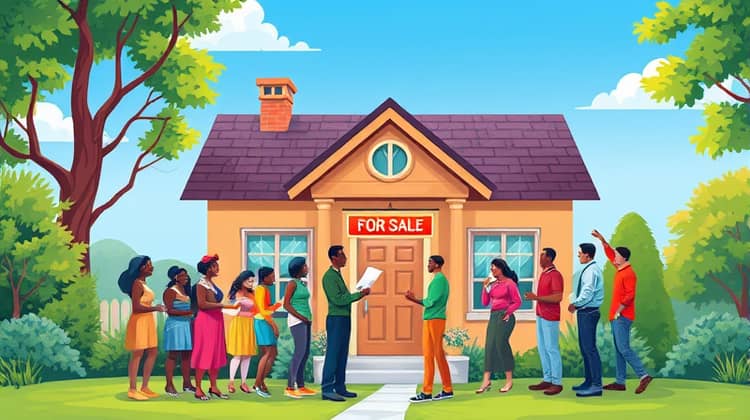In the quest for homeownership, understanding the various types of mortgages available is crucial. Government-backed loans, especially FHA, VA, and USDA loans, offer unique advantages and can be an excellent option for eligible borrowers. This article delves deep into these loans, highlighting their distinctive features, benefits, and downsides, helping prospective homeowners make informed decisions.
With so many loan options available, it can be overwhelming to find the right fit. FHA, VA, and USDA loans are designed to assist specific groups of individuals, including first-time homebuyers, veterans, and those purchasing in rural areas. Each loan has its own prerequisites, advantages, and challenges, making it essential to assess your personal situation before proceeding.
By exploring the intricacies of these government-backed mortgages, we aim to provide clarity on which loan type may be suitable for you. Whether you are looking to buy your first home, are a veteran looking to leverage your benefits, or need assistance in a rural area, this guide covers key points to consider.
So, let's begin our exploration of these crucial pathways to homeownership, understanding what each loan type offers and whom they are best suited for.
Understanding Government-Backed Mortgages

Government-backed mortgages are loans that are insured or guaranteed by a government agency. They are designed to make it easier for individuals to purchase homes, particularly those who might struggle to qualify for conventional loans due to credit history or financial circumstances.
These mortgages typically come with lower down payment requirements, competitive interest rates, and flexible lending terms. However, they also impose certain eligibility criteria and requirements that borrowers must meet to qualify.
FHA Loans

FHA loans, insured by the Federal Housing Administration, are particularly popular among first-time homebuyers due to their flexible credit score requirements and low down payment options.
- Low down payment (as low as 3.5%)
- More flexible credit score standards
- Assumability features that allow a buyer to take over the seller's mortgage
- Lower mortgage insurance premiums compared to conventional loans
These features make FHA loans an attractive choice for many borrowers who may not have substantial savings or perfect credit.
Benefits of FHA Loans
FHA loans come with several advantages that make them appealing to homebuyers.
- Lower down payment requirement
- Easier credit score qualification
- Potential for higher debt-to-income ratio allowance
- Ability to secure loans despite previous financial difficulties
These benefits play a significant role in making homeownership accessible to a broader demographic, particularly younger and first-time buyers.
Drawbacks of FHA Loans
While FHA loans offer many benefits, there are also some disadvantages to consider.
One primary drawback is:
- Mandatory mortgage insurance premiums (MIP) for the life of the loan
- Loan limits that may restrict purchasing power in high-cost areas
- Strict property standards that must be met
- Potentially higher overall borrowing costs compared to conventional loans
Prospective borrowers considering FHA loans should weigh these drawbacks against their unique financial situations and long-term goals.
VA Loans

VA loans are available to veterans, active-duty service members, and certain members of the National Guard and Reserves. These loans are backed by the U.S. Department of Veterans Affairs and offer a range of unique benefits.
- No down payment required
- No private mortgage insurance (PMI)
- Lower interest rates compared to conventional loans
- Ease of refinance options through Interest Rate Reduction Refinance Loans (IRRRL)
These features provide significant financial relief and flexibility for eligible borrowers, making homeownership more accessible for veterans and active service members.
Benefits of VA Loans
VA loans come with several outstanding benefits primarily designed for those who have served in the military.
- Competitive interest rates
- No down payment requirement
- No private mortgage insurance (PMI)
- Flexibility with credit score requirements
These advantages can make a substantial difference in the affordability of homeownership for veterans and active-duty personnel.
Drawbacks of VA Loans
Despite their many advantages, VA loans also have some limitations that potential borrowers should consider.
Some of the key drawbacks include:
- Funding fee that can be added to the loan amount
- Restrictions on property types that can be purchased
- Potential delays in processing times during peak seasons
- Limited to qualified veterans and service members
Understanding these drawbacks is essential in determining whether a VA loan is the right choice for you compared to other mortgage options.
USDA Loans

USDA loans, backed by the U.S. Department of Agriculture, provide financing for rural and suburban homebuyers who meet specific income requirements. These loans are designed to promote homeownership in eligible areas, making them an attractive choice for those looking to buy in less populated regions.
USDA loans typically require no down payment, making them particularly beneficial for qualified low- to moderate-income households wishing to enter the housing market.
- No down payment requirement
- Lower mortgage insurance costs than FHA loans
- Flexible credit standards
- Focus on rural development and availability
However, to qualify, borrowers must meet certain criteria, including income limits and property location restrictions.
Benefits of USDA Loans
The unique features of USDA loans make them a favorable option for many aspiring homeowners.
- No down payment requirement
- Subsidized mortgage insurance rates
- Competitive interest rates
- Focus on promoting homeownership in rural areas
These benefits help many individuals achieve their dream of homeownership who might otherwise find it challenging to secure a traditional mortgage.
Drawbacks of USDA Loans
While USDA loans present many advantages, there are also some downsides to consider.
Some notable drawbacks include:
- Strict eligibility requirements based on income
- Homes must be located in designated rural areas
- Potentially longer processing times
- Limited availability if the area is deemed non-rural
It's important for hopeful borrowers to carefully assess these drawbacks to determine if a USDA loan aligns with their home-buying goals.
Comparing FHA, VA, and USDA Loans

When considering government-backed mortgage options, it's essential to compare the functions of FHA, VA, and USDA loans. Each loan type serves a different demographic and purpose, from assisting first-time buyers to serving veterans and promoting rural homeownership.
Making the right choice often depends on individual circumstances including credit scores, income levels, and the type of property desired.
- FHA loans are suitable for first-time homebuyers with lower credit scores.
- VA loans offer the best terms for eligible veterans and service members.
- USDA loans cater to those looking for homes in rural areas without a down payment.
Identifying which loan aligns with your personal financial situation can significantly enhance your chances of successful homeownership.
Conclusion

In conclusion, government-backed mortgages, including FHA, VA, and USDA loans, represent vital resources for individuals looking to achieve their homeownership dreams. Each loan type provides unique advantages and challenges, making it essential for prospective borrowers to understand these nuances.
Researching these options thoroughly can open doors to affordability and access in housing. Government-backed loans can provide pathways to homeowners who might struggle with conventional loans due to down payment or credit challenges.
Ultimately, evaluating personal qualifications and aligning them with the benefits of each loan can lead to successful financing and ownership outcomes.














